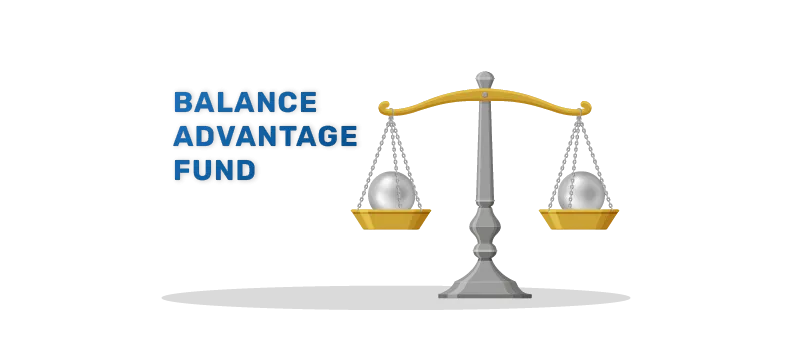Can balanced advantage funds add stability to your portfolio?


Investing in mutual funds offers a diversified and professionally managed approach to growing wealth. Among the various categories of mutual funds available in India, balanced advantage funds stand out for their ability to adapt to market conditions, potentially adding relative stability to an investor’s portfolio.
This article explores the concept of balanced advantage funds and assesses their role in enhancing portfolio stability.
What are balanced advantage funds?
Balanced advantage funds, also known as dynamic asset allocation funds, belong to the category of mutual funds that employ a dynamic investment strategy. These funds actively manage their allocation between equity and debt instruments based on the prevailing market conditions. These funds are designed to mitigate portfolio risks by varying their equity exposure in response to market valuations.
Know about Bajaj Finserv Balanced Advantage Fund
The Bajaj Finserv Balanced Advantage Fund offers both Direct and Regular Plans, providing investors with options based on their preferences and investment goals. This fund aims to optimise the return potential by tactically managing the asset allocation between equities and debt instruments.
Here are some key Features of the Bajaj Finserv Balanced Advantage Fund:
- Minimum application amount: Investors can begin with a minimum lumpsum investment as low as Rs. 500 or start an SIP for the same amount. This allows even small investors – who may not have ready access to a large sum of money – to participate in the markets.
- Asset allocation pattern: The Bajaj Finserv Balanced Advantage Fund maintains a flexible asset allocation strategy, allowing a maximum equity exposure of 90% and a minimum of 65%. Debt and money market instruments can range from 10% to 35% depending on the market situation.
- Balanced advantage funds and portfolio stability: Balanced advantage funds like those offered by Bajaj Finserv AMC aim to mitigate risks and provide relative stability by dynamically managing the asset allocation between equity and debt instruments.
Before making an investment into this fund, investors must consider the below points:
- Define investment goals and risk tolerance: Clearly define your investment objectives – whether it's wealth creation, retirement planning, or any specific financial goal. Assess your risk tolerance to determine how much volatility you are comfortable with.
- Asset allocation strategy: Decide on the proportion of equity and debt exposure that aligns with your investment goals and risk tolerance. Balanced advantage funds automatically manage this asset mix dynamically.
- Select a suitable scheme: Choose a scheme that suits your risk profile and investment horizon and aligns with your asset allocation strategy. Research the fund's strategy and expense ratio before investing.
- Stay informed and updated: Stay informed about market trends, economic indicators, and any changes in the fund's strategy. Regularly update your investment strategy based on changing market conditions.
- Consultation with financial advisor: Seek advice from a financial advisor for personalised guidance on managing your portfolio effectively. An advisor can provide insights and recommendations tailored to your specific financial situation and goals.
Balanced advantage funds are suitable for whom?
Balanced advantage funds can be suitable for investors seeking a balanced mix of growth potential and risk management within a single investment vehicle. The primary goal of these funds is to deliver a relatively stable return potential over the long term while managing market volatility effectively. However, these funds are categorised as ‘high risk’ on the riskometer. Hence, investors must align their risk appetite to that of the fund before making a decision.
Conclusion
Balanced advantage funds can potentially enhance portfolio stability through their dynamic asset allocation strategy. They provide investors with a well-managed avenue to participate in market growth while aiming to minimise volatility. The focus on risk management, potential for higher returns, and tax efficiency make the Bajaj Finserv Balanced Advantage Fund a compelling investment option for those looking to diversify their portfolio. For a detailed scheme information, click here.
FAQs:
What is the minimum investment required for Bajaj Finserv Balanced Advantage Fund?
There are two ways to invest in the fund – lumpsum or SIP. The minimum application amount for both is Rs. 500.
How is the asset allocation managed in Bajaj Finserv Balanced Advantage Fund?
These funds maintain a flexible asset allocation strategy, allowing a maximum equity exposure of 90% and a minimum of 65%. The remaining allocation is in debt and money market instruments.
Who should opt for balanced advantage funds?
Balanced advantage funds are suitable for investors seeking a balanced mix of growth potential and risk management within a single investment vehicle.
Mutual Fund investments are subject to market risks, read all scheme related documents carefully.
This document should not be treated as endorsement of the views/opinions or as investment advice. This document should not be construed as a research report or a recommendation to buy or sell any security. This document is for information purpose only and should not be construed as a promise on minimum returns or safeguard of capital. This document alone is not sufficient and should not be used for the development or implementation of an investment strategy. The recipient should note and understand that the information provided above may not contain all the material aspects relevant for making an investment decision. Investors are advised to consult their own investment advisor before making any investment decision in light of their risk appetite, investment goals and horizon. This information is subject to change without any prior notice.